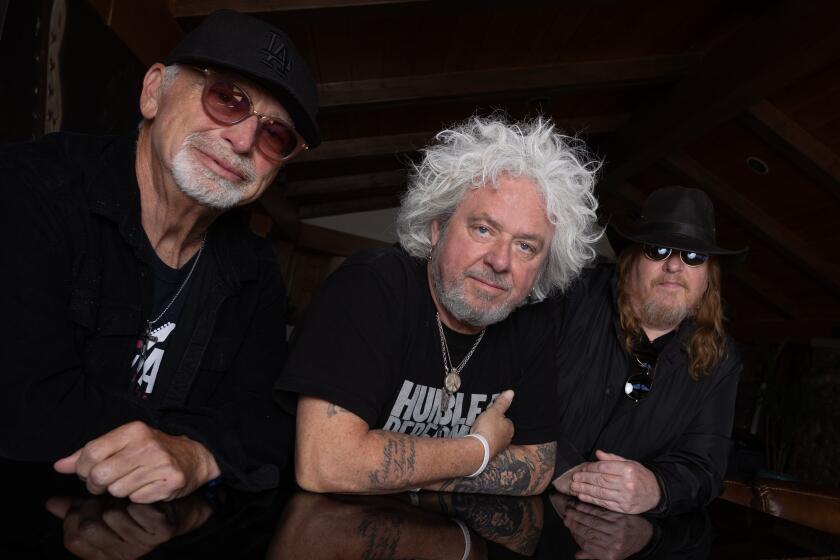How Time’s Up is training a troop of diverse Hollywood executives
“I want to be in the room where it happens,” sings Aaron Burr in the hit musical “Hamilton.” In the song, he’s referring to a secret dinner-table bargain that changes the course of the country.
But he might as well be talking about Hollywood and the “rooms” where key decisions are made about which movies and TV shows get green-lighted.
“It’s fair to say most ‘rooms’ in Hollywood — whether they are development, production, business affairs or marketing rooms, etc. — are woefully homogeneous,” said Jenno Topping, president of film and television at Chernin Entertainment.
“They are largely white, middle-upper and middle-class groups of people, and way more men than women, especially the higher up the ranks you go. It thus lends itself to an environment akin to an echo chamber — often insular in taste, perspective, ideas and problem-solving methodology.”
Time’s Up Entertainment is trying to change that. This year, the organization debuted Who’s in the Room, a mentorship program designed to increase the presence of people of color and other underrepresented groups in the producing and executive ranks.
“The population watching content has never been more far-reaching or diverse,” said Topping, a mentor in the program and a member of its steering committee. “It only makes sense that the people creating and selling these stories be equally diverse in order to enhance and maximize the opportunity.”
The initiative launched with a class of 23 people, all of them in assistant or other entry-level positions and all trying to transition into junior executive roles. This particular jump is a tough one that requires sacrifices that only a privileged few can make.
“Taking a very low wage job at a major agency or studio is feasible for maybe other kids who come from different socioeconomic backgrounds,” said mentee Chisom Ude.
“Even then, you may not be able to be matched with bosses who help young people learn, or work at a company that promotes from within. Everybody cares about how you can get into the business, but nobody really helps nurture you once you get in.”
Working as an assistant in the entertainment industry means long hours and low salaries for years, potentially while repaying student loans and facing high Los Angeles rents.
Any time off the clock is expected to be spent networking or watching movies and television shows to keep up with bosses and clients. It’s a near-impossible ask for anyone who is financially strained or is expected to contribute to a family’s well-being after graduating from college.
“It’s the first test of the survival of the fittest,” tetraVision president Tara Duncan, who is also a mentor in the program, said of the industry’s assistant ranks. “You’re working long hours for minimum wage — sometimes even less — and with people who come from Ivy League schools and money.
“Couple that with the fact that you need an understanding of the dominant culture or to fit a profile of what the higher-ups deems promotion-worthy. It can also feel completely random at times, because it is.”
The program aims to minimize that randomness as much as possible for participants by providing them with financial-aid flex-funds and sessions outlining all the unwritten rules of rising in the ranks of Hollywood. That means learning how to track and develop hot intellectual property and mastering such skills as deal-making and legal speak. It’s as “Hamilton’s” Burr describes, “how the game is played, the art of the trade, how the sausage gets made.”
“From the get-go, everything has been very action-oriented in asking what are the specific steps to take to basically arm yourself with the tools to become an executive,” said Daniel Yu, an assistant to Fox Searchlight’s Matthew Greenfield.
“Things like being literate in film and TV classics so you can speak the same language as writers and directors, learning your boss’ taste so you can be a great assistant and dealing with office politics. I’ve found it immensely helpful.”
Participants are immediately assigned mentors who have been candid about their industry experience.
“It seems like everyone else had an uncle or their dad and that’s how they get their knowledge, but I come from so far outside entertainment, and I didn’t know anybody in this town when I moved here,” said D’Joy Falaye, executive assistant to FX Chairman John Landgraf. “It’s nice to have that space where I can ask questions and learn about things other people might already know.”
“We’ve learned so many lessons the hard way,” said Priya Swaminathan and Tonia Davis, co-heads of Higher Ground Productions and mentors in the program. “If we can save our mentees some time as they learn these rules and, more importantly, if we can start to change some of the more arcane and unwritten ones, we’ll be ecstatic.”
Though only a few months in, the initiative has already seen positive results. More than half the participants have transitioned into new roles, either through promotions or securing new jobs.
Bolanle Fapohunda is now a creative executive at Color Force after working as an assistant in various capacities for nearly five years. She found out about the job through a conversation at one of the program’s mixers.
“My mentor gave me all the tools and tips to be prepared for every interview and how to put together my packages,” she said. “She sent me flowers on my first day of work. In a big city like this where you can feel so lost, it’s nice to have people who truly care about you.”
That isn’t limited to just mentors, though.
“Having this community of people who understand what you’re going through, people you can fall back on after a tough day, it’s so helpful,” Fapohunda added with a smile. “I think we’re all gonna be in this industry for a long time and support each other in any avenue we take.”
More to Read
The biggest entertainment stories
Get our big stories about Hollywood, film, television, music, arts, culture and more right in your inbox as soon as they publish.
You may occasionally receive promotional content from the Los Angeles Times.







